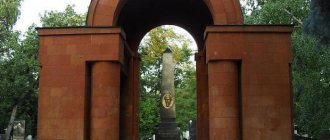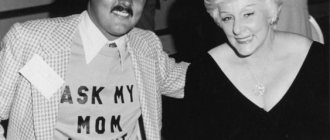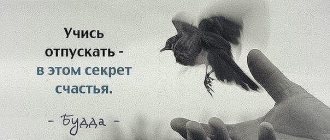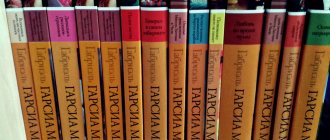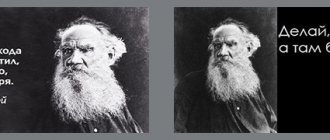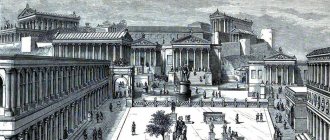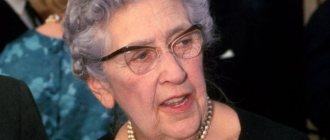Biography
Hakim Abulqasim Mansour Hassan Ferdowsi Tusi
(Persian حکیم ابوالقاسم منصور حسن فردوسی توسی; 935-1020) - Persian and Tajik poet. The author of the epic poem “Shahnameh” (“Book of Kings”), the poem “Yusuf and Zuleikha” (a biblical-Koranic story about Joseph) is also attributed to him. He is very popular and is considered the national poet in Iran, Tajikistan, Uzbekistan and Afghanistan.
Ferdowsi reads the poem “Shah-Nama” to Shah Mahmud of Ghazni.
Painting by V. Surenyants, 1913 Born between 932 and 936 in the vicinity of the city of Tus, in Khorasan, into a Shiite-Ismaili family of dikhkan, as feudal landowners were then called. It can be assumed that Ferdowsi's estates were small and only barely fed their owners, whose situation during these years of incessant wars was very difficult.
There is almost no information about Ferdowsi’s childhood and youth. He received a good education for that time, was fluent in both literary languages of Iran of that era - Arabic and Persian, and, perhaps, was even familiar with the literary language of pre-Muslim Iran - Pahlavi.
Ferdowsi (his poetic name translates as “Paradise”) highly valued knowledge: “Seek paths to intelligent words, go through the whole world to gain knowledge.”
He received the nickname “hakim” (“sage”, “scientist”) for the depth and breadth of his knowledge.
Ferdowsi's youth falls on the period of Iranian history when the local feudal aristocracy, after a number of years of Arab domination, freed itself from the yoke of the conquerors and in remote parts of the caliphate again seized power into their own hands.
He lived in Ghazni for a long time, was in the service of Sultan Mahmud of Ghaznavid (to whom he dedicated the Shahnameh). However, the main idea of the poem, that only hereditary bearers of royal power have the right to it, did not please Sultan Mahmud, who was more satisfied with the legitimacy of force rather than heredity.
"Firdowsi's funeral." Painting by Gazanfar Khalykov, 1934
According to a well-known legend, which does not have exact confirmation, the Sultan refused to pay Ferdowsi for the poem. This greatly angered the poet, and he wrote a satire in which he reproached the Sultan for being descended from a slave. As a result of the Sultan's anger, Ferdowsi was forced to flee the country and wander in poverty for the rest of his life. The legend inspired D. Kedrin to write the poem “ Dowry
».
There is a legend according to which, shortly before the death of Ferdowsi, Sultan Mahmud accidentally heard from one of the courtiers an expressive verse from the “Shahname”, inquired about the author and learned that the verse was from the “Book of Kings” dedicated to Mahmud by the famous Ferdowsi, who now lives in poverty in Tus . Mahmud immediately ordered a rich gift to be sent to Tus for Ferdowsi (60,000 silver dirhams - according to Aruzius; 60,000 gold chervonets - according to later legends). And Ferdowsi died shortly before this. At the same time when his body was being carried out through one city gate for burial, camels with gifts from Mahmud entered another city gate.
grave
Ferdowsi was buried in the city of Tus in his own garden, since local clerics did not allow him to be buried in the city cemetery. The governor of Khorasan province ordered the construction of a mausoleum over the grave of Ferdowsi, after which this place became an object of mass worship. Subsequently, the burial place fell into disrepair, and by order of Reza Shah it was restored on the millennium of the poet’s birth, in the period 1928-1934. The restoration was carried out by the National Heritage Society of Iran, after which Ferdowsi's tomb was elevated to the rank of a national shrine.
Excerpt characterizing Ferdowsi
“One spirit, otherwise it’s lost,” shouted the fourth. - Yakov, give me a bottle, Yakov! - shouted the owner himself, a tall handsome man standing in the middle of the crowd wearing only a thin shirt open at the middle of his chest. - Stop, gentlemen. Here he is Petrusha, dear friend,” he turned to Pierre. Another voice of a short man with clear blue eyes, which was especially striking among all these drunken voices with its sober expression, shouted from the window: “Come here - settle the bet!” It was Dolokhov, a Semyonov officer, a famous gambler and brigand who lived with Anatole. Pierre smiled, looking around him cheerfully. - I don’t understand anything. What's the matter? - Wait, he's not drunk. Give me the bottle,” said Anatole and, taking a glass from the table, approached Pierre. - First of all, drink. Pierre began drinking glass after glass, looking from under his brows at the drunken guests who were again crowded at the window, and listening to their conversation. Anatole poured him wine and told him that Dolokhov was betting with the Englishman Stevens, a sailor who was here, that he, Dolokhov, would drink a bottle of rum while sitting on the third floor window with his legs hanging out. - Well, drink it all! - said Anatole, handing the last glass to Pierre, - otherwise I won’t let you in! “No, I don’t want to,” Pierre said, pushing Anatole away and went to the window. Dolokhov held the Englishman’s hand and clearly, distinctly spelled out the terms of the bet, addressing mainly Anatole and Pierre. Dolokhov was a man of average height, with curly hair and light blue eyes. He was about twenty-five years old. He did not wear a mustache, like all infantry officers, and his mouth, the most striking feature of his face, was completely visible. The lines of this mouth were remarkably finely curved. In the middle, the upper lip energetically dropped onto the strong lower lip like a sharp wedge, and something like two smiles constantly formed in the corners, one on each side; and all together, and especially in combination with a firm, insolent, intelligent gaze, it created such an impression that it was impossible not to notice this face. Dolokhov was a poor man, without any connections. And despite the fact that Anatole lived in tens of thousands, Dolokhov lived with him and managed to position himself in such a way that Anatole and everyone who knew them respected Dolokhov more than Anatole. Dolokhov played all the games and almost always won. No matter how much he drank, he never lost his clarity of mind. Both Kuragin and Dolokhov at that time were celebrities in the world of rakes and revelers in St. Petersburg. A bottle of rum was brought; the frame that did not allow anyone to sit on the outer slope of the window was broken out by two footmen, apparently in a hurry and timid from the advice and shouts of the surrounding gentlemen. Anatole walked up to the window with his victorious look. He wanted to break something. He pushed the lackeys away and pulled the frame, but the frame did not give up. He broke the glass. “Well, how are you, strong man,” he turned to Pierre. Pierre took hold of the crossbars, pulled, and with a crash the oak frame turned out. “Get out, otherwise they’ll think I’m holding on,” said Dolokhov. “The Englishman is bragging... huh?... good?...” said Anatole. “Okay,” said Pierre, looking at Dolokhov, who, taking a bottle of rum in his hands, was approaching the window from which the light of the sky and the morning and evening dawns merging on it could be seen. Dolokhov, with a bottle of rum in his hand, jumped up onto the window. "Listen!" he shouted, standing on the windowsill and turning into the room. Everyone fell silent. - I bet (he spoke French so that an Englishman could understand him, and did not speak this language very well). I bet you fifty imperials, would you like a hundred? - he added, turning to the Englishman. “No, fifty,” said the Englishman. - Okay, for fifty imperials - that I will drink the entire bottle of rum without taking it from my mouth, I will drink it while sitting outside the window, right here (he bent down and showed the sloping ledge of the wall outside the window) and without holding on to anything... So? ... “Very good,” said the Englishman. Anatole turned to the Englishman and, taking him by the button of his tailcoat and looking down at him (the Englishman was short), began repeating to him the terms of the bet in English. - Wait! - Dolokhov shouted, banging the bottle on the window to attract attention. - Wait, Kuragin; listen. If anyone does the same, then I pay one hundred imperials. Do you understand? The Englishman nodded his head, not giving any indication as to whether he intended to accept this new bet or not. Anatole did not let go of the Englishman and, despite the fact that he nodded, letting him know that he understood everything, Anatole translated Dolokhov’s words to him in English. A young thin boy, a life hussar, who had lost that evening, climbed onto the window, leaned out and looked down. “Uh!... uh!... uh!...” he said, looking out the window at the stone sidewalk. - Attention! - Dolokhov shouted and pulled the officer from the window, who, entangled in his spurs, awkwardly jumped into the room. Having placed the bottle on the windowsill so that it would be convenient to get it, Dolokhov carefully and quietly climbed out the window. Dropping his legs and leaning both hands on the edges of the window, he measured himself, sat down, lowered his hands, moved to the right, to the left and took out a bottle. Anatole brought two candles and put them on the windowsill, although it was already quite light. Dolokhov's back in a white shirt and his curly head were illuminated from both sides. Everyone crowded around the window. The Englishman stood in front. Pierre smiled and said nothing. One of those present, older than the others, with a frightened and angry face, suddenly moved forward and wanted to grab Dolokhov by the shirt. - Gentlemen, this is nonsense; he will be killed to death,” said this more prudent man. Anatole stopped him: “Don’t touch him, you’ll scare him, he’ll kill himself.” Eh?... What then?... Eh?... Dolokhov turned around, straightening himself up and again spreading his arms. “If anyone else bothers me,” he said, rarely letting words slip through his clenched and thin lips, “I’ll bring him down here now.” Well!... Saying “well”!, he turned around again, let go of his hands, took the bottle and brought it to his mouth, threw his head back and threw his free hand up for leverage. One of the footmen, who began to pick up the glass, stopped in a bent position, not taking his eyes off the window and Dolokhov’s back. Anatole stood straight, eyes open. The Englishman, his lips thrust forward, looked from the side. The one who stopped him ran to the corner of the room and lay down on the sofa facing the wall. Pierre covered his face, and a weak smile, forgotten, remained on his face, although it now expressed horror and fear. Everyone was silent. Pierre took his hands away from his eyes: Dolokhov was still sitting in the same position, only his head was bent back, so that the curly hair of the back of his head touched the collar of his shirt, and the hand with the bottle rose higher and higher, shuddering and making an effort. The bottle was apparently emptied and at the same time rose, bending its head. “What’s taking so long?” thought Pierre. It seemed to him that more than half an hour had passed. Suddenly Dolokhov made a backward movement with his back, and his hand trembled nervously; this shudder was enough to move the entire body sitting on the sloping slope. He shifted all over, and his hand and head trembled even more, making an effort. One hand rose to grab the window sill, but dropped again. Pierre closed his eyes again and told himself that he would never open them. Suddenly he felt that everything around him was moving. He looked: Dolokhov was standing on the windowsill, his face was pale and cheerful. - Empty! He threw the bottle to the Englishman, who deftly caught it. Dolokhov jumped from the window. He smelled strongly of rum. - Great! Well done! So bet! Damn you completely! - they shouted from different sides. The Englishman took out his wallet and counted out the money. Dolokhov frowned and was silent. Pierre jumped onto the window. Gentlemen! Who wants to bet with me? “I’ll do the same,” he suddenly shouted. “And there’s no need for a bet, that’s what.” They told me to give him a bottle. I'll do it... tell me to give it.
Creation
The Shahnameh is the only work by Ferdowsi whose authorship has been indisputably established. Perhaps Ferdowsi wrote poems in his youth, but they have not survived to this day. For some time, Ferdowsi was also credited with the poem “Yusuf and Zuleikha” (a biblical-Koranic story about Joseph), but currently the scientific community denies his authorship. There is also controversy among scholars about a satirical poem supposedly by Ferdowsi, in which the poet ridiculed Sultan Mahmud of Ghaznavi for not properly rewarding the poet's work. Ferdowsi's early biographer Nizami Aruzi claimed that the entire text of this poem, except for six lines, was destroyed by a well-wisher who specially bought this poem from Ferdowsi for a thousand dirhams. A number of fragments of the Shahnameh text are similar to satirical poems; some scholars consider them to be fabricated, others are inclined to consider them to be genuine creations of Ferdowsi.
Name [edit]
With the exception of his kunya (ابوالقاسم - Abu'l-Qasim) and his laqab (فِردَوسی - Ferdowsi
, which means "heavenly"), nothing is known for certain about his full name.
From the beginning he was called by various additional names and titles, the most common of which was حکیم/akīm ("philosopher"). [7] Based on this, his full name is given in Persian sources as حکیم ابوالقاسم فردوسی توسی / akīm Abu'l-Qāsim Firdowsī usī. Due to the non-standard transliteration from Persian to English, English works use different spellings of his name, including Firdosi
,
Firdusi
,
Firdozi
,
Ferdowsi
, etc. The
Encyclopedia of Islam
uses the
Ferdowsi
, based on the German Oriental Society's standardized transliteration method .
[3] The encyclopedic Iranica
, which uses a modified version of the same method (with a stronger emphasis on Persian intonations), gives the spelling
Ferdowsi
.
[7] In both cases, -ow
and
-aw
should be expressed as a diphthong (
[aʊ̯]
), reflecting the original Arabic and early Modern Persian pronunciation of the name. The modern Tajik transliteration of his name in Cyrillic is Hakim Abulkosim Firdavsi Tusi.
Memory
Mausoleum at the poet's grave in Tus
Ferdowsi's grave
Scenes from Shahnameh
Monument to Ferdowsi in Tehran Monument to Ferdowsi in Rome
- For the 1000th anniversary of the poet, in 1933, the Azerbaijani poet and playwright Huseyn Javid wrote the play “Siyavush” based on one of the plots of his poem “Shahname”.
- Ferdowsi University (Mashhad, Iran).
- The area named after Ferdowsi (Tehran, Iran) with a monument to the poet and metro station.
- Street named after Ferdowsi (Dushanbe, Tajikistan).
- District named after Ferdowsi (Dushanbe, Tajikistan) with a monument to the poet
- Street named after Ferdowsi (Yerevan, Armenia).
- Street named after Ferdowsi (Baku, Azerbaijan).
- Street named after Firdousi (Tashkent, Uzbekistan).
- Street named after Firdousi (Samarkand, Uzbekistan).
- Monument to Ferdowsi in Rome.
- Ferdowsi Prize
- A bust of Ferdowsi is installed at the entrance to the National Library of Tajikistan (Dushanbe).
- Based on Ferdowsi's work "Shahname", director Boris Kimyagarov made a film trilogy - "The Tale of Rustam" (1971), "Rustam and Sukhrab" (1971) and "The Tale of Siyavush" (1976, "Tajikfilm").
See also[edit]
- Poetic portal
- Iranian studies
- Ferdowsi Millennium Celebration
- Mashhad Ferdowsi University
- List of Persian poets and authors Hafez, Persian poet
- Rumi (1207–1273) is perhaps the most famous Persian poet worldwide.
(film, 1934)
Translations into Russian
- Truths: Sayings of the Persian and Tajik peoples, their poets and sages. / Per. N. I. Grebneva. St. Petersburg: ABC-classics, 2005. 256 p. (first edition M.: Nauka. Main editorial office of Eastern literature, 1968)
- Book of Kings Shahnameh, trans. M. L. Lozinsky, ed., with comments and article by F. A. Rosenberg, M. - L., 1934;
- Shahnameh, trans. C. B. Banu and A. A. Lahuti, Art. and comment. A. A. Starikova, ed. A. A. Lakhuti and A. N. Boldyreva, vol. 1–4, M., 1957–69;
- Shah-nameh: Critical text: In 9 volumes. M., 1960–1971.
- Shahnameh, vol. 1–2, trans. V.V. Derzhavin and S.I. Lipkin. Entry Art. I. S. Braginsky, prepared by. text and notes M.-N. O. Osmanova, M., 1964.
- Excerpts from Shahnameh
Notes
- [feb-web.ru/feb/litenc/encyclop/leb/leb-7531.htm Ferdowsi]
- article from the Literary Encyclopedia 1929-1939 - [feb-web.ru/FEB/LITENC/ENCYCLOP/leb/leb-7531.htm FIRDOUSI]
- Krymsky A.E.
Firdousi // Encyclopedic Dictionary of Brockhaus and Efron: in 86 volumes (82 volumes and 4 additional). - St. Petersburg, 1890-1907. - A. Shahpur, Shahbazi
[www.iranicaonline.org/articles/ferdowsi-iii Ferdowsi, Abul-qasem. Mausoleum]. Columbia University (Dec 15, 1999). Retrieved March 27, 2014. - [www.iranicaonline.org/articles/ferdowsi-i Iranica
article on “Ferdowsi”] - [www.iranicaonline.org/articles/ferdowsi-ii Iranica
article on “Hajw-nāma”]
Links[edit]
- Davis, Dick (2006). Introduction. Shahnameh: The Persian Book of Kings
. Ferdowsi, Abolqasem. Viking. ISBN 0-670-03485-1. - Fry, Richard N. (1975). Golden Age of Persia
. Weidenfeld. - Brown, E. G. (1998). Literary history of Persia
. ISBN 0-7007-0406-X. - Rypka, Jan (1968). History of Iranian Literature
. Reidel. ISBN 90-277-0143-1. OCLC 460598. - Aghai, Shirzad (1997). Imazh-ha-ye mehr va mah dar Shahnameh-ye Ferdousi (Sun and Moon in
Shahnameh
Ferdousi
. Spanga, Sweden. ISBN 91-630-5369-1. - Aghai, Shirzad (1993). Nam-e kasan va jai-ha dar Shahname-ye Ferdusi (Personalities and Places in
Shahnameh
Ferdusi
. Nyköping, Sweden. ISBN 91-630-1959-0. - Wiesehöfer, Joseph (18 August 2001). Ancient Persia
. IBTauris. ISBN 1-86064-675-1. - Shahbazi, A. Shapur (1991). Ferdowsi: a critical biography
. Harvard University, Center for Middle East Studies. ISBN 0-939214-83-0. - McKee, Sandra; Harrop, W. Scott (2008). Iranians: Persia, Islam and the Soul of a Nation
. University of Michigan. ISBN 978-0-525-94005-0. - Chopra, R. M. (2014). Great Poets of Classical Persian
. Kolkata: Sparrow. ISBN 978-81-89140-75-5. - Waghmar, Burzin and Sharma, Sunil (2016). Ferdowsi: scholium. In Sunil Sharma and Burzin Waghmar, eds. Firdawsii Millennium Indicum: Materials of the seminar “Millennium Shahnama”, Oriental Institute named after.
K. R. Cama, Mumbai, 8-9 January 2011 , pp. 7-18. Mumbai: KR Cama Oriental Institute, ISBN 978-93-81324-10-3.
